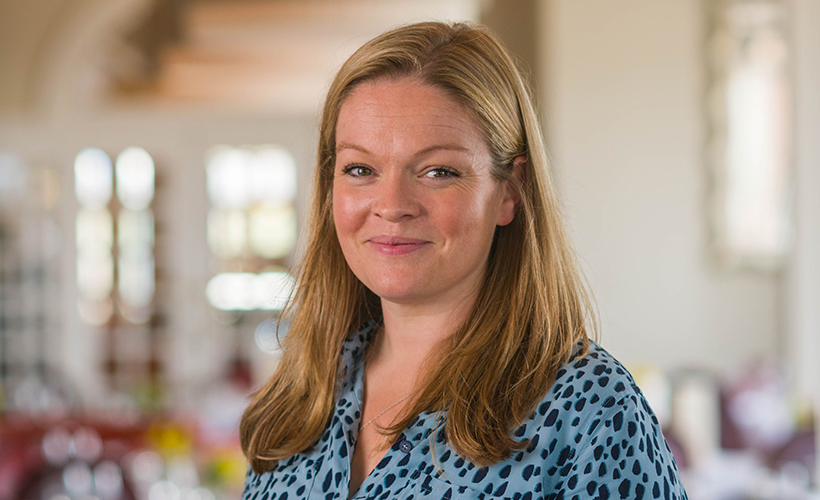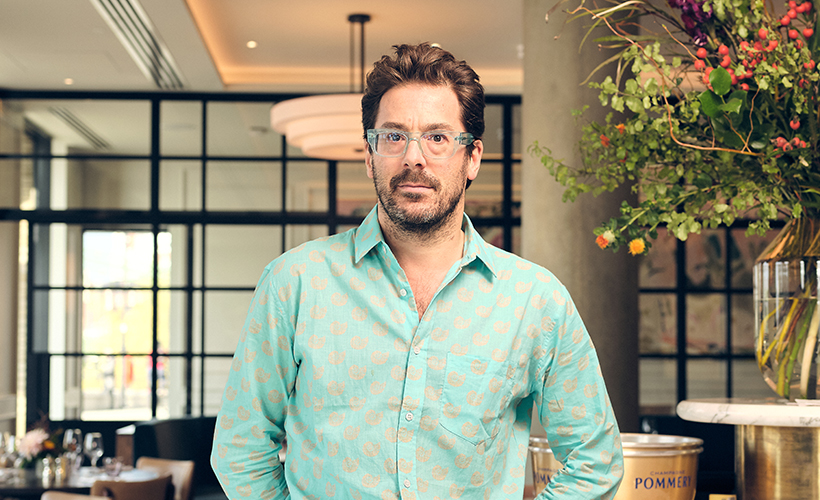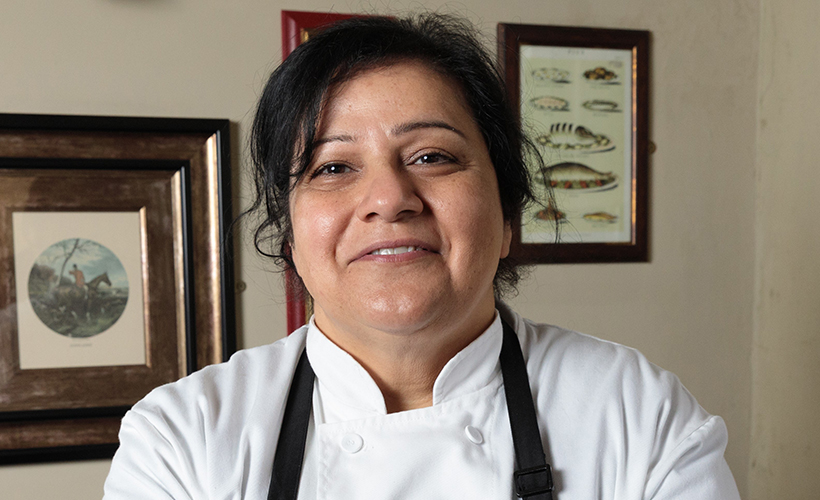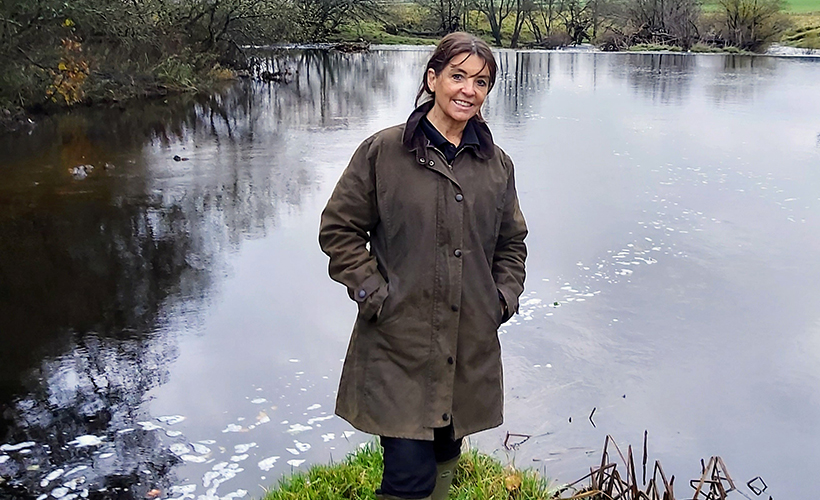In the third instalment of our operator diaries, we hear that the shadow of rising prices is affecting Christmas planning, that apprenticeships are going strong, and that in the middle of these hectic and unpredictable times, everyone should make the time to pause
Veryan Palmer, director, Headland hotel, Newquay
We've had 10 really strong individuals [on the hotel's summer placement scheme for 14- to 16-year-olds], who have done really well. They're now really comfortable in their roles and it's great to see some of the more reticent younger staff, who were just 14 when they started with us, really coming on in leaps and bounds and becoming a key part of the teams.
They've gone from carrying wobbly trays and things being dropped in the first week to now, where they're gliding around our big restaurant, which does 200 for breakfast. One of our young people was voted employee of the month by the staff, three weeks after starting. He joined as a junior porter in the front of house team and won because of his amazing attitude. He's just awesome at talking to guests.
One of our young people has also been filmed for a University of Exeter research project about young people in work, encouraging others into the workplace. It's going to be shown to all primary schoolchildren in Cornwall and the Isles of Scilly, which will be brilliant.
Certainly nine, possibly all 10, will stay with us on a very part-time basis doing predominantly Saturday mornings, for two or three hours. They love their wages – they receive £8.81 an hour – and if they're under 16 they don't pay any tax. I'm hearing some lovely things from the parents as well about how they're enjoying feeling part of a grown-up team.
We try and help them see what their progression routes would be if they stayed within the industry. We've got people whose parents are wanting to talk about apprenticeships. We're going to have 17 apprentices aged between 16 and 51 with us from September. It shows that apprenticeships aren't just for young people, but actually for a lot of the young people down in Cornwall it's a great way for an employer to pay you to go to college.
We've got another young person who's in her second year and is going to get A-stars and As at A-level and is going to go and read medicine. She's not interested in joining the hospitality industry full time, but she's quite eloquent in talking about how it's taught her how to talk to people. She said she can talk to anyone now, which is an amazing skill if you want to be a doctor.
This year's cohort finish at the end of this week. We do a graduation ceremony, which their parents or guardians attend, and any of them who have done barista training or health and safety training will receive their certificates, which shows how much training you get early on in hospitality. Then we tell them about going to talk to friends [about the placement] and they become our ambassadors.
We start applications for next year in January and this year we think we'll get 150 videos submitted [from potential recruits].
Sam Harrison, founder, Sam's Riverside, Hammersmith, London
The transport strikes saw the highest number of no-shows we've ever had last week, which was very frustrating as normally our no-shows are minimal. Last week and this week are traditionally our two quietest weeks of the year – it's peak summer holiday time for London, and so to have that level of no-shows was quite difficult.
Overall though, this summer has been busier than I anticipated and July and August have been much stronger. A lot of people in west London are away, but the people who are here want to go out and have fun. Tonight is Tuesday and it should be pretty quiet but we have 150 booked for dinner.
Traditionally I would say the beginning of September can be quiet as people come back from holiday and settle back into life, and then it ramps up a bit. But because we've not seen that total drop-off I'm hoping it continues, although I'm very conscious of what will come this winter.
From my experience of the last recession in 2007/2008 I found people still wanted to go out, have a good time and meet with friends, but spending habits changed and people were looking for better value – maybe not spending so much on wine and opting for a good value set menu.
This time round it feels like it could be worse and that worries me. For a lot of people, it hasn't hit yet and there's still a euphoria of the normality of life after lockdown. I do think people are still going to want to go out. It'll be a tough winter, but I've always thought that if you're good enough and you work that bit harder and make sure you're still delivering value, you're going to have half a chance.
Our mid-week set lunch menu is currently £20 for two courses and £25 for three, which I think is pretty good value, but it's getting harder and harder to make the margin we need as the prices of ingredients increase. So do I increase that menu price? Or do I make less margin and hope they spend the money on cocktails or wine?
Maybe we have to be cleverer with the items on the menu, but then that can end up costing more in terms of labour. It probably should be £25 for two courses, but we don't know how the customer will react to that, and I do think a well-priced set menu is a real benchmark for a restaurant.
Stosie Madi, chef and co-owner, the Parkers Arms, Newton-in-Bowland, Lancashire
Now is the time of year we tend to plan for Christmas and send out emails to incentivise people to start booking, but we can't do that because we don't know what's around the corner. I can't even imagine what the prices are going to be in three months' time. How do you cost a menu for December when every day of the week prices are up and down? We haven't got a clue what's going to be available.
Where we are is very rural and we have a very harsh winter, so we rely a lot on Christmas trade. I worry if we don't [email customers] we'll miss the boat and people will book elsewhere, but we have to remind ourselves our customers will still be there. I'm not putting my Christmas menu out there just yet; I have to look at the market.
It's a bit like being in limbo. Everybody is holding their horses. I'm an eternal optimist but I'm not feeling it. It may be that lots of companies will hold back on Christmas bookings because they might not know what the situation will be with their employees. A big cheese supplier near us has just gone into administration with 62 people made redundant. Things like that are not encouraging.
People will always want to go out and celebrate but you've got to make it worth their while. I don't just mean with value for money – we're going to have to bank on human nature that wants to socialise, celebrate and live and we'll have to grab people somehow. Things now are more difficult than the pandemic ever was. We'll just have to work hard.
We've been trying to forage all week, which hasn't gone well because it's been so dry, but we have found a beautiful big hen of the woods mushroom, which means our forests are livening up. Hopefully by the end of the week we'll be able to get some more mushrooms and wild berries in as everything has been a bit shrivelled up. So that's a bit of good news to have.
Debrah Dhugga, COO, the Apartment Group
I'm at Newton Hall at Newton-by-the-Sea today, and it's a beautiful day. It is wonderful to be able to work at such lovely locations, but it doesn't deflect from the very difficult time we are having in the industry right now.
Despite the eight-week summer holiday period we have across our sites (with an earlier start in Scotland) and being 90% booked across the group, there is no denying that there are multiple issues we are all tackling right now.
The most significant is that of increasing costs. Energy costs are at a critical high and are having a huge impact on businesses. For us, that includes electricity, water heating and oil tanks.
We are constantly talking about this as a management team, especially as we have lots of night venues with a huge uptake of energy. Just here at Newton Hall we have 27 cabins and 17 of them have hot tubs, which are run on electricity. The cost of running these is going to be phenomenal with the energy increases.
We've talked about various cost-saving options, but you must be careful in luxury venues, as you could jeopardise service levels by implementing initiatives such as turning off lights in rooms. It's hard to save costs because everything is going up and if we increase our prices too much we are in danger of losing customers.
On top of the increase in energy bills, there is the general hike in the cost of living for our customers. Our guests are spending more time in their own homes as their bills go up, they have less cash flow and are cutting back on meals out and stays in hotels. People might only go out once a week.
I also think we will start to see a decline in staycations now people can pick up short-stay [flights] in Europe for £500. The airports are busy, despite the chaos we've seen, and people want to escape as they've not been able to go away for so long.
I should mention our suppliers too, as the situation with rising costs is affecting them. I feel sorry for them as there are lots of negotiations going on and they've had all their costs go up as well.
There doesn't currently seem to be much light at the end of the tunnel.
The industry is in a worse place than it was during Covid. The added problem is that we are already short-staffed and, because of the extra burden of price rises, there is additional negativity – this doesn't help bring in new grassroot talent.
We are all going to have to work more closely with colleges and universities to bring young staff into the industry. We are also working with more part-time workers and local communities, and creating roles like breakfast waiter or waitress to promote flexible working and attract people with the warmth and personality who will flourish in hospitality, no matter the challenges. We can teach the skills.
Julie Crump, COO, Caviar & Chips
One of our leadership days last week got me thinking about how we're creating a culture where everyone is safe to be at work and can be the best of themselves. It was a situational leadership half-day training, and we started with a bit of theory and went on to using the forum to do some wellbeing. We did gentle seated exercises and meditation and paused to remember that we're all human and we need to relax and manage stress levels – even in the middle of the busy wedding season.
It's a balance: you're here to learn and serve food and drink, but it's important to remind our leadership team that we need to look after ourselves and our people as individuals.
We also did a gratitude session, where people took turns to say what they were grateful for. It was a little awkward in a ‘stop-talking-about-me' kind of way, but people soon realised it was about sharing positivity and raising self-esteem. These regular days or half-days are so important and it means our leaders have now got the tools to spread that within their teams.
It's easy to say we have a culture where we care about our teams, but it's not just about sending a few emails – you have to live and breathe it. It's really important to us. Despite the fact that the hospitality industry is quite transactional and people come and go, it doesn't matter if someone is with us for a month, a year or 10 years – all of their experiences with us should be about learning and developing, although that does sometimes mean people learn about themselves and realise ‘I'm in the wrong job and I need to leave'!
We have over 100 people across our payroll now and when we see them struggling with different challenges in their lives – whether it's things at home, difficulty travelling with the strikes, trouble with finances with the cost of living crisis or physical and mental health – when they come to work we see it as a way for us to support them to be the best of themselves.
We start each shift with a check-in, so we can understand if something is distracting them. We don't want to make assumptions that the person might be being lazy when they're actually being distracted about something going on at home. If they are, we might offer to put them on a role that's less guest-facing that day.
We also have Wellbeing Wednesday and this week we focused on finance and savings. With everything going on with the economic environment, we know it affects our team, not just our business, so we offer help where we can.
We also work with Hospitality Action and provide external signposts for people to access financial help, counselling or legal advice, because we're not an expert in those things. But 80% of our payroll is aged between 16-25, it's their first or maybe second job, so it's important to create that open culture and environment where people can be themselves.
Nina Matsunaga, chef patron, the Black Bull, Cumbria
We've finally had some good weather in Cumbria so we've been really busy with outdoor dining over the past few weeks, which has been a relief. We also have a new member of staff joining us from the apprenticeship scheme we launched, so we're excited to welcome him. He's 16, just finishing his catering course at his local college, and he will be starting with us full-time in September. He used to do pot-washing at a private school, but he's always been interested in food, so we're hoping to train him up as a chef. We're very lucky to have him.
On top of that, our oven seals have finally arrived! It took about three or four months. No wonder we're so cautious now about ordering equipment from European suppliers.
In the meantime, we're getting ready for the Meatopia festival in early September. It's going to be one of the biggest outside events we've done so far, so there's quite a lot to prepare. We've also introduced a new beef dish with a smoky Thai dip to the menu and it's doing surprisingly well. People seemed apprehensive at first because it's quite sour and salty and more often served with pork, but over the last two weeks, orders for that have been through the roof.
We felt a lot of pressure during the recent heatwaves. People were feeling tired but still have to power through the heat. It's not easy for kitchen staff to work when it's this hot with full knowledge that everyone else is relaxing in the beer garden. I'm just trying to manage the workload to reduce tension where possible.
Our guests are also feeling the toll of inflation and the cost of living crisis. We're running out of the cheapest cuts, such as mince or dice first, instead of the prime cuts that are used for steaks. This has never happened before. I think everyone is being quite conscious of their spending.
Mitigating food price increases
By David Read, chairman, Prestige Purchasing
If you eliminate things like lowering food standards and cutting portion sizes then there are essentially just two strategies to reduce the impact of price increases in these times of high inflation. They are:
- Looking inside your own business regarding what and how you buy, and..
- Managing markets well
Both are of course easier said than done!
Look inside your own business first
Ingredient ranging The first step is to challenge everything that may raise your, or your supplier's cost of supply. The starting point for this is your menus. Count the number of ingredients that you are buying, and the frequency with which they change.
Specification Is the specification for each product the best one? Can you change it or substitute other ingredients, without damaging the rate of sale?
Deliveries Can you reduce the frequency of delivery thereby raising the size of each delivery? Can you consolidate suppliers, or get existing suppliers to deliver other supplier's stock? Can you change your delivery times to be less costly to the supplier?
Stock Are you managing shelf life and avoiding food waste?
Terms Do you pay your suppliers quickly?
Relationship Are you close to your suppliers, and have regular collaborative discussions about improving service and reducing costs?
Manage markets well
Buying spot Some restaurants plan menus around buying daily at best market price. It's possible for chef led small restaurants with a group of local suppliers, but generally considered difficult to manage at larger scale.
Contracting Suppliers like volume, certainty and commitment. The more you can give, and the more you keep your promises, the better the price you can achieve. Stay close with your suppliers, review every price increase request and challenge them to find ways to mitigate increases.
Resource Use professional skilled buyers to source your food
Inflation Use the Foodservice Price Index (FPI) to measure your cost performance against the market and deliver success using its market insights.
Continue reading
You need to be a premium member to view this. Subscribe from just 99p per week.
Already subscribed? Log In















